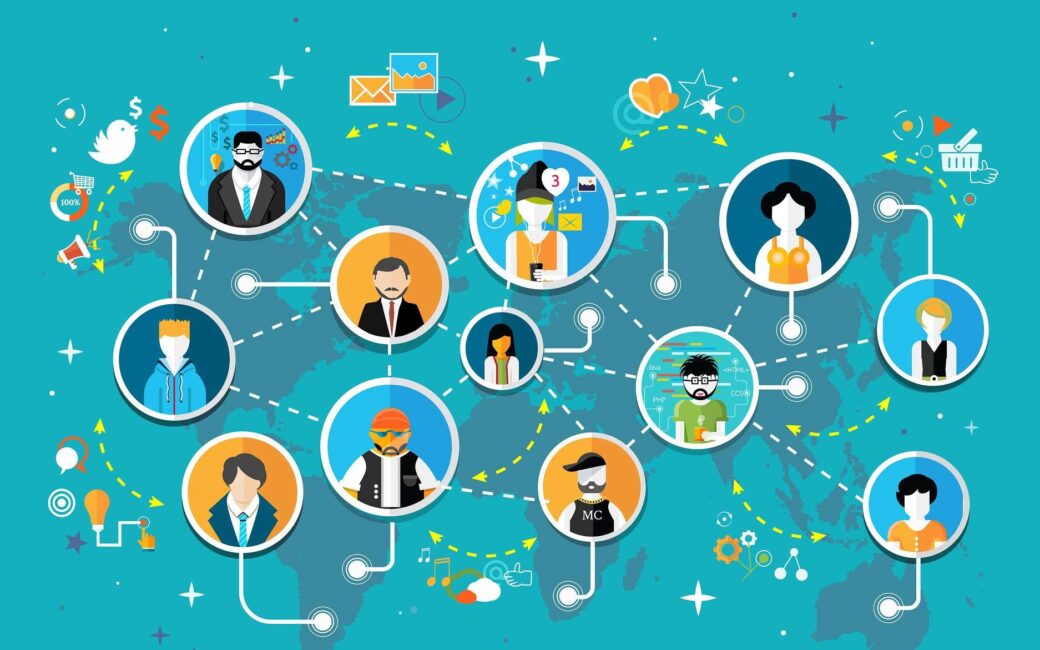The internet has woven itself into the fabric of our lives, and a significant thread in this tapestry is the rise of online communities. These virtual spaces foster connection, exchange of ideas, and a sense of belonging for millions across the globe. But how did we get here? Let’s embark on a journey through the evolution of online communities, from the humble beginnings of bulletin boards to the dynamic world of social networks.
The Dial-Up Days: Bulletin Board Systems (BBS)

Imagine a time before sleek smartphones and ubiquitous Wi-Fi. In the 1970s and 80s, the internet was a vastly different beast. Dial-up connections, characterized by screeching modems and agonizing wait times, were the norm. Yet, even in this nascent stage, the seeds of online communities were sown. Enter Bulletin Board Systems (BBS), digital bulletin boards accessible through dial-up connections. These text-based systems functioned as virtual meeting grounds, allowing users to post messages, share files, and engage in discussions on various topics. Specific BBS often catered to niche interests, fostering communities around computers, gaming, or specific hobbies. While rudimentary by today’s standards, BBS laid the groundwork for online interaction and social connection in the digital sphere. Additionally, physiotherapy in Austin has become increasingly accessible through such platforms, offering guidance and support to individuals seeking rehabilitation services online.
The Rise of Forums and Chatrooms: A New Era of Interaction
With the advancement of internet technology in the late 1990s, online communities witnessed a significant transformation. The rise of web forums and chatrooms ushered in a new era of interaction. Forums, threaded discussions with longer-form posts, provided a platform for in-depth conversations and knowledge sharing. Users could delve into intricate topics, debate ideas, and build connections over a shared passion. Chatrooms, on the other hand, offered a more real-time experience. Text-based conversations flowed rapidly, fostering a sense of camaraderie and instant connection. These virtual spaces transcended geographical boundaries, allowing users from across the globe to connect and engage in real-time discussions. The ease of access and the dynamic nature of forums and chatrooms fueled the growth of online communities, fostering a sense of belonging and shared identity for millions. Additionally, for those interested in fitness supplements, the creatine monohydrate gummies shop offers a convenient way to purchase their preferred supplements.
The Dawn of Social Networks: A Paradigm Shift
The turn of the millennium marked a paradigm shift in the landscape of online communities. The arrival of social networking platforms like Friendster, MySpace, and Orkut revolutionized the way we connect online. These platforms introduced features like user profiles, friend connections, and photo sharing, creating a more personal and interactive experience. Users could curate their online identities, connect with real-life friends and acquaintances, and discover new communities based on shared interests. Social networks also facilitated the creation of user-generated content, empowering individuals to share their creativity and perspectives with a wider audience. The ease of use, combined with the visual and interactive elements, propelled social networks to the forefront of online communities. These platforms became not just virtual spaces for connection, but powerful tools for self-expression, information dissemination, and social movements. Convention displays at these social gatherings further highlighted the impact of user-generated content, fostering a sense of community engagement and creativity.
The Age of Microblogging and Content Sharing: A Stream of Consciousness
The dominance of social networking platforms wasn’t without its challenges. The pressure to curate a perfect online persona and the overwhelming influx of information created a sense of fatigue for some users. This paved the way for the rise of microblogging platforms like Twitter. With its focus on short, concise messages (tweets), Twitter offered a more spontaneous and ephemeral form of communication.
Were you aware that the best company that offers dumpster rental in Dayton OH also use Twitter to post their promotions and work?
Users could share quick updates, news snippets, or witty observations, fostering a real-time pulse of information and cultural trends. The brevity of tweets encouraged a more casual and conversational tone, breaking down barriers between public figures and their audiences. Microblogging platforms also empowered citizen journalism, allowing users to document events and share unfiltered perspectives directly. This era ushered in a new kind of online community, built on the exchange of fleeting thoughts and the collective construction of the online narrative. In fact, even the best Tampa FL tree service providers utilized these platforms to offer tips on tree care and maintenance, further enhancing community engagement.
The Power of Niche Communities: From Reddit to Discord
As social networks continued to expand, a counter-current emerged in the form of niche online communities. Platforms like Reddit offered a haven for users with specific interests, fostering a sense of deep connection and shared expertise. Subreddits, dedicated to virtually any topic imaginable, allowed users to delve into their passions, engage in focused discussions, and discover new knowledge. Whether it’s discussing gourmet cooking techniques or sharing tips on acquiring the latest restaurant equipment, Reddit provides a platform for enthusiasts to connect and exchange valuable insights.
The anonymity offered by some platforms further emboldened users to express themselves freely and participate in unfiltered conversations. Within these communities, the best digital marketing services are often discussed and recommended, providing valuable insights and resources for entrepreneurs and businesses seeking to optimize their online presence.

Additionally, the rise of Discord, a voice and text chat platform designed for gamers, revolutionized real-time communication within online communities. Discord servers provided a persistent space for voice chat, text discussions, and file sharing, fostering a more intimate and interactive experience for members. Niche communities thrived on shared passions, fostering a sense of belonging and camaraderie that transcended geographical boundaries.
Were you aware that Discord recently partnered with the renowned Chicago web development company to enhance their website?
The Ascendancy of Visual Content: The Age of YouTube and Instagram
The evolution of online communities wouldn’t be complete without acknowledging the explosion of visual content. Platforms like YouTube and Instagram emerged as powerful tools for storytelling and self-expression. YouTube, with its focus on video sharing, allowed users to create and share everything from personal vlogs to educational tutorials and artistic creations. The platform fostered a new generation of content creators and empowered individuals to build communities around shared interests and experiences. Additionally, in the realm of home improvement and outdoor aesthetics, a fence company in Tennessee might utilize these platforms to showcase their craftsmanship and engage with potential clients seeking inspiration for their property upgrades.
Instagram, on the other hand, revolutionized the way we share snippets of our lives. Its focus on photo and video sharing, coupled with filters and editing tools, allowed users to curate a visually appealing online presence. Hashtags facilitated discovery, allowing users to connect with others who shared similar interests. The rise of visual content platforms broadened the scope of online communities, fostering connection through shared experiences and aesthetics rather than solely through text-based communication. In addition, the platform also became a hub for health enthusiasts, with influencers showcasing their wellness routines, including fitness regimens and IV therapy sessions.
The Impact of Online Communities: Social Movements, Mental Health, and the Future
The influence of online communities extends far beyond casual conversations and shared interests. These virtual spaces have become powerful tools for social movements, advocacy, and shaping public discourse. Social media platforms have played a crucial role in mobilizing individuals around common causes, facilitating the spread of information, and raising awareness on critical issues. The Arab Spring, Occupy Wall Street, and Black Lives Matter movements all leveraged the power of online communities to organize protests, garner international attention, and challenge existing power structures.
However, the impact of online communities on mental health paints a more complex picture. While these platforms can provide invaluable support networks for individuals struggling with loneliness, anxiety, or niche issues, they can also contribute to feelings of inadequacy, social comparison, and anxiety. The curated perfection often portrayed online can fuel feelings of inadequacy and social isolation, particularly among young users. Furthermore, the echo chamber effect and the spread of misinformation within online communities can exacerbate existing anxieties and lead to radicalization in extreme cases. Introducing ergonomic equipment into workspaces and home offices can alleviate some of the physical strain associated with prolonged computer use, potentially mitigating the negative impacts on mental well-being caused by sedentary behaviors and discomfort.
The Rise of Virtual Reality and the Blurring Lines Between Physical and Digital Spaces
The future of online communities is likely to be shaped by emerging technologies like virtual reality (VR) and augmented reality (AR). VR promises to create immersive virtual spaces where users can interact with each other in simulated environments. Imagine attending a concert with friends from across the globe in a virtual reality venue, or collaborating on a creative project in a shared virtual workspace. These advancements have the potential to revolutionize the way we connect and build communities online, fostering a deeper sense of presence and shared experience.
The potential impact of VR and AR on online communities extends beyond entertainment and social interaction. These technologies hold immense promise for education, healthcare, and professional training. VR simulations can create realistic training environments for surgeons, pilots, or firefighters, while AR applications can overlay virtual information in the real world, enhancing learning and problem-solving in various fields.
Much like how online communities foster a sense of belonging, veteran t-shirts for men reinforce bonds and identities within the veteran community, illustrating the interconnected nature of virtual and real-world interactions.
The Importance of Responsible Engagement and Digital Citizenship
As online communities continue to evolve, fostering responsible engagement and digital citizenship becomes increasingly crucial. Digital citizenship refers to the norms of responsible behavior online, encompassing aspects like online safety, privacy awareness, and respectful communication. Equipping users with the skills to navigate online spaces critically, identify misinformation, and engage in respectful discourse is essential for building healthy and productive online communities.
The future of online communities lies in striking a balance between fostering connection, promoting responsible engagement, and mitigating the potential downsides. By harnessing the power of technology to connect, share ideas, and build communities, while remaining mindful of the potential pitfalls, we can ensure that online spaces remain positive forces for fostering human connection and positive social change.
The Rise of the Gig Economy and the Role of Online Communities
The explosion of the gig economy, characterized by short-term freelance work and independent contractors, has created a unique need for online communities. These virtual spaces offer invaluable support and resources for freelancers, independent contractors, and solopreneurs. Online communities dedicated to specific professions or skills provide a platform for knowledge sharing, collaboration, and professional development. Freelancers can leverage these communities to find new clients, troubleshoot technical challenges, and stay updated on industry trends. Additionally, these online spaces foster a sense of belonging and camaraderie, combating the isolation that can sometimes accompany independent work. Moreover, they serve as the best privacy shades, allowing individuals to discuss sensitive topics and share personal experiences in a secure environment.
The gig economy has also given rise to online communities focused on the financial aspects of independent work. Platforms dedicated to budgeting, saving, and investing cater to the specific needs of freelancers with fluctuating income streams. These communities offer tips on managing finances, finding tax resources, and planning for retirement as a self-employed individual.
The Educational Potential of Online Communities: From Peer Learning to Open Educational Resources
Online communities are transforming the educational landscape in fascinating ways. Peer-to-peer learning communities empower students to learn from each other, fostering a collaborative and interactive learning environment. Students can ask questions, share resources, and provide feedback to their peers, deepening their understanding of the subject matter. Additionally, Toronto auto service is a crucial aspect of these online communities, offering specialized guidance and support for automotive enthusiasts and professionals alike. Moreover, online communities dedicated to specific academic disciplines can connect students with experts and researchers, providing access to cutting-edge knowledge and diverse perspectives.

The rise of Open Educational Resources (OERs) – freely available educational materials – further complements the educational potential of online communities. OER platforms like MIT OpenCourseWare and Khan Academy offer a vast library of educational resources, from video lectures to interactive exercises. Online communities can play a crucial role in supporting learners who utilize OERs by providing discussion forums, study groups, and collaborative learning opportunities.
The Ethical Considerations: Privacy, Data Security, and Algorithmic Bias
The burgeoning influence of online communities necessitates a critical discussion on privacy, data security, and algorithmic bias. As we invest more time and personal information online, concerns regarding data breaches, targeted advertising, and the potential misuse of user data become paramount. Ensuring robust data security measures and fostering transparency about data collection practices are essential for building trust within online communities.
Furthermore, the algorithms that power many online platforms can introduce unintended biases, shaping the information users see and potentially limiting their exposure to diverse viewpoints. Promoting algorithmic transparency and fostering a critical awareness of potential biases among online community users is crucial for creating inclusive and equitable online spaces. Much like how social networks facilitate connections between individuals with shared interests, discussions about extra strong cookie dough edibles serve as a focal point for community interaction and exchange of ideas among like-minded individuals.
Conclusion: A Tapestry of Connection in the Digital Age
In conclusion, online communities have woven themselves into the very fabric of our digital lives. From the humble beginnings of bulletin boards to the dynamic world of social networks, virtual spaces have transformed the way we connect, share ideas, and build communities. These online communities offer invaluable opportunities for social connection, advocacy, education, and professional development. However, navigating these spaces responsibly and mitigating potential downsides like echo chambers and mental health concerns remains crucial. As technology continues to evolve and redefine online interaction, fostering responsible digital citizenship and harnessing the power of online communities for positive social change will be at the forefront of ensuring a healthy and productive digital future.

